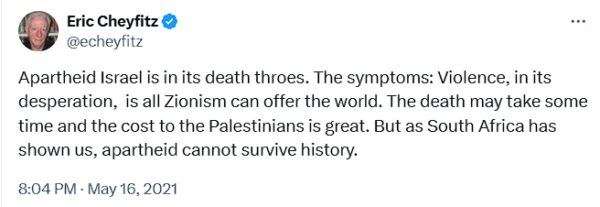Academic freedom is an important value that must be protected. That includes protection against those who would exploit their freedom to undermine academic integrity and the academic freedom of others from within. At Cornell University, that threat is emerging.
The context surrounding this threat has to do with a course being offered at Cornell by an extremist and antisemitic professor, Eric Cheyfitz, entitled “Gaza, Indigeneity, Resistance.” Cheyfitz is known, for example, for offering a “teach-in” just weeks after Hamas’s massacre on October 7 about “Gaza, Settler Colonialism, and the Global War Against Indigenous People.” In Cheyfitz’s telling, the Jews – who have maintained a presence in their indigenous homeland for thousands of years – were not the indigenous people, but rather the settler-colonial villains.
A post on X by Eric Cheyfitz.
Another professor, Menachem Rosensaft, wrote to Michael Kotlikoff, Cornell University’s interim president, to share concerns about the course. Kotlikoff’s response, which somehow ended up in a Nov. 11 Jewish Telegraphic Agency article: “I share your concerns and am extremely disappointed with the [school] curriculum committee’s decision to offer the course and the course’s apparent lack of openness and objectivity.” Kotlikoff continued, according to JTA:
“Cornell courses should provoke thought and present multiple viewpoints, rather than transmit pre-formed views of a complex conflict, and I personally find the course description to represent a radical, factually inaccurate, and biased view of the formation of the State of Israel and the ongoing conflict,” Kotlikoff wrote. Kotlikoff added that, while concerns about infringing on academic freedom prevented him from intervening against the course, he was working with faculty focused on Israel and the Middle East to offer different kinds of courses so that “students interested in the history of the Middle East and Zionism will find more substantive and objective offerings.”
Kotlikoff’s leaked private correspondence set off a firestorm of misleading criticism among radical members of Cornell’s faculty. The leadership of Cornell’s chapter of the American Association of University Professors (AAUP) issued a scathing statement, claiming he was “threaten[ing]…bedrock principles of academic freedom” and that by working to offer more objective courses, he was really trying to force political criteria into “how Palestine should be studied and taught…”
But the Cornell AAUP’s statement only highlights how far the association has fallen.
Kotlikoff’s remarks betrayed no political motive. On the contrary, his remarks focused specifically on concerns about the course’s factual inaccuracy and lack of openness and objectivity. Kotlikoff’s concerns mirrored Rosensaft’s, who has written: “My principal objection to this course is not that it has a decidedly and unabashedly pro-Palestinian, anti-Israel bent. What I find most problematic and unacceptable about it is that it is firmly rooted in shoddy, selectively and inflamingly biased pseudo-scholarship.”
Academic freedom is not absolute. Even according to the AAUP itself, “academic freedom of an individual faculty member is subject to…professional competence.” The 1940 Statement of Principles on Academic Freedom and Tenure provides that faculty should “at all times be accurate, should exercise appropriate restraint, should show respect for the opinions of others…” Kotlikoff’s remarks were aimed at precisely these issues.
His concerns are entirely justified, too. The lack of academic quality in Cheyfitz’s course can be gleaned from just the course description, which falsely claims in the first paragraph that the ICJ found a “plausible genocide” in Gaza.
But more importantly, Kotlikoff’s remarks demonstrate a greater understanding of the academic mission of a university. Kotlikoff himself explicitly cited academic freedom as reason not to intervene against the course itself. Instead, he sought to encourage more speech and study of the subject from more diverse viewpoints.
One would think this push for greater viewpoint diversity doesn’t conflict with the AAUP’s goals. The association has, after all, endorsed diversity, equity, and inclusion criteria for faculty evaluation on the claim that “[p]rogress toward diversity goals has resulted in better knowledge production that has started to fill in some of the gaps, expose and correct blind spots, and open entirely new vistas of inquiry that were not possible without it.”
But in truth, the AAUP isn’t concerned about academic freedom or intellectual diversity. To the contrary, it’s concerned about preserving ideological conformity in academia. One need only consider the AAUP’s endorsement of the antisemitic boycott movement, which cut off academic perspectives from an entire national group.
As CAMERA has exposed in the past, radical academics like Cheyfitz aren’t interested in real academic freedom. To the contrary, they openly seek to exploit their positions of influence over young minds to indoctrinate them, not educate them.
University administrators, and faculty with integrity, owe it to their students and to the broader public to stand against this exploitation. As Kotlikoff recognized, higher education should exhibit openness and objectivity in pursuit of the truth, not bigotry and dogmatism. Kotlikoff and Rosensaft deserve our thanks.
This article was originally published on CAMERA.org


